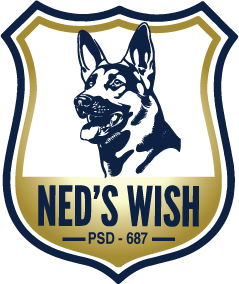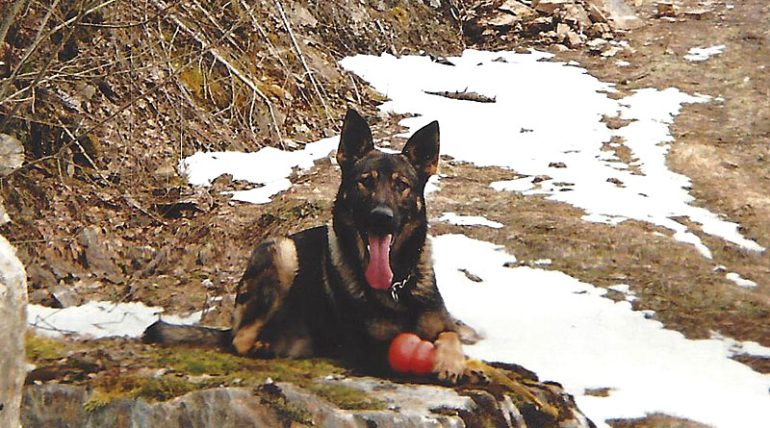Q & A with manager and creator of Ned’s Wish, Stacey Talbot
By Nick Petlock on November 23, 2023
Police and military dogs retire like any other officer, but they don’t get a pension. So, who then pays for their care? This is where the not-for-profit Ned’s Wish comes in.
Founder and President Stacey Talbot talks in more depth about what the charity does, how they receive funding and why she created Ned’s Wish.

Q: How did Ned’s Wish become a charity, and when?
A: So I’ve had the privilege and honour of taking on a few retired police service dogs, and I recognized that there was a gap when they retire because the person who takes custody of these dogs is now fully responsible for all their health care needs, liability, all of that. Ned, whom the society is named after, had some significant health issues that I was solely responsible for. So I got together with some amazing colleagues and friends, and we started working on the charity in about 2017, but it really took us to May 1, 2019.
Q: What does the charity support? Where do the funds go?
A: Right now, our mandate is to look after these retired heroes, both police service dogs and military service dogs, and we look after their medical well-being. So we essentially pay veterinary medical bills for these dogs so that they can receive the best care possible, and then they can actually enjoy a retirement because now the cost of veterinary medicine, although it’s extremely advanced, it comes with quite a cost.
Q: As a retired police officer yourself, why is it important to have an organization for retired police/military dogs?
A: So I, as you said, being a retired police officer, I saw firsthand exactly the type of work that these dogs go through to keep our citizens safe, to be able to gather evidence so that we can have successful prosecutions in the court. These dogs are absolutely amazing, the work they do. I mean, they’re out there not just finding those missing people or those missing children, they’re out there everyday tracking people that have committed different offences, they are finding small articles that may be attached to some offence, it could be a murder weapon, it could be something extremely valuable. Every law enforcement agency wants everyone to come home safely, whether that’s the person who committed the crime, whether it’s the public in general and the police officers themselves, and these dogs go above and beyond to keep everybody safe.
They are our, what we call our less lethal option; we are able to deploy these dogs in the most high-risk situations, and as we know, over the years, we’ve unfortunately lost a few of them during the line of duty and every situation is tragic, but that’s also allowed our human partners to be able to come home safe and come home to their families. There’s so much good that these dogs do, and sometimes, the public may not be aware of all their capabilities.

Q: What makes retired police and military dogs different from other dogs you would adopt?
A: These dogs, you have to remember, are born and bred into a specific line of duty. These dogs are bred for their agility, for their loyalty, for their determination, for their tracking skills. So these dogs are different in a sense that they had a whole working career, they didn’t get to choose, they didn’t get to be a pet and sleep on the couch, they’re going out in the middle of the night, they’re jumping in and out of trucks, their tracking. I like to equate them to a pro-athlete. They have to do their workouts every day. They go to work every day. In that sense, when they retire, their bodies have endured quite a bit through their working years, and their bodies can no longer keep up with the demands of the job.
Q: Can you adopt the dogs?
A: There are civilians who have adopted them; they’re very few and far between. Obviously, a lot of our handlers, the dogs will retire with them because they have an extreme bond. The dog has saved their lives. They have all the skillsets to look after that dog. They know that dog.
We are seeing occasions where, for a multitude of reasons that the handler can’t keep it; maybe it’s got a new dog coming on, and they don’t get along. But the thing to remember with these dogs is they’re very highly trained, and maybe not in the things that most people would like a pet to do. So, for instance, these dogs have been trained if they are searching for something, it is acceptable and actually encouraged that they get on counters, they get into things, they jump all over things. As a pet, that’s probably a behaviour you’re not trying to shape, and that would be an acceptable behaviour. It really takes a family that can be knowledgeable and skillful enough to take on one of these retired dogs and make sure that it stays in a safe environment where it can enjoy its retirement.
Q: Who is Ned?
A: Ned was my second retired police dog that I had the honour bestowed upon me to look after. Ned worked in both Comox. He started off as a puppy in northern Alberta up in Peace River, and then he was reteamed with a new handler in Manitoba. He served in three different provinces; he had a lot of very successful tracks, he had a lot of very successful calls. In fact, he was actually the police service dog that attended the unfortunate Greyhound bus incident in Manitoba. We had five glorious years with Ned in his retirement; I’ll be it based on a lot of his injuries, he dealt with a lot of health issues, and again, that’s where the story is born because I probably spent, over the five years I had him, over $50,000 in veterinary medical bills. Some of which was covered by insurance, but a lot of it we had to cover ourselves.

Q: How can a person interested in the cause support?
A: There are a number of different ways; obviously, we look for financial donations to help pay medical bills, but we also look for anybody that has specific skill sets. Unfortunately, because we’re not like your traditional charity, where you have a shelter and you have a bunch of dogs at a shelter, some people maybe think that they can come and hang out with a bunch of retired police dogs; that’s not the case cause our dogs are all over the country with their specific families. But there are so many ways to support us; if you have skillsets like we always look for people with Microsoft Office or different things that can help us out in the background, fundraising, sponsorships, but also you know a lot of good things come from people that like to go out and do their own thing, and we become the benefactor of maybe some proceeds.
We have three or four different major fundraising experiences every year; we have a heroes run that commemorates a dog that’s fallen in the line of duty, and we are always looking for sponsorships to cover some of our fundraising costs so that we can continue to do the good work that we do and pay our medical bills.
To learn more or get involved with Ned’s Wish, visit their website and follow them on their Instagram and Facebook page.
